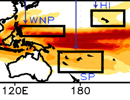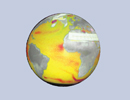Future Climate
Global WarmingIncreased atmospheric concentrations of greenhouse gases produced by mankind have led to a global rise in surface temperatures. Since the beginning of the 20th century the average temperature increased by about 0.8°C (1.4F). Climate model projections indicate that the global surface temperature is likely to increase by another 1.1 to 6.4°C (2 to 11.5F) by the year 2100 depending on man-made greenhouse gas emissions during that time.→ |
 |
Ocean AcidificationSince the beginning of the Industrial Revolution humans have released ~500 billion tons of carbon into the atmosphere. The oceans have taken up about 30% of this. The uptake leads to changes in ocean chemistry resulting in a decrease of seawater pH and carbonate ion concentration, commonly referred to as ocean acidification. → |
 |
Ocean Acidification IIThe absorption of man-made CO2 emissions by the ocean has substantially lowered the seawater pH and the concentration of carbonate ions - a process called ‘ocean acidification’. The availability of carbonate ions is crucial for marine calcifying organisms to form their skeletons or shells that are made of crystalline forms of calcium carbonate. → |
 |































